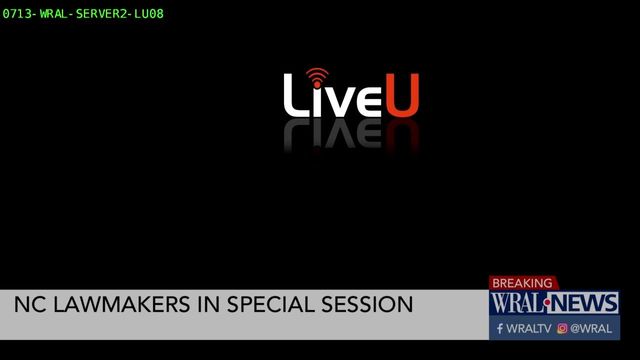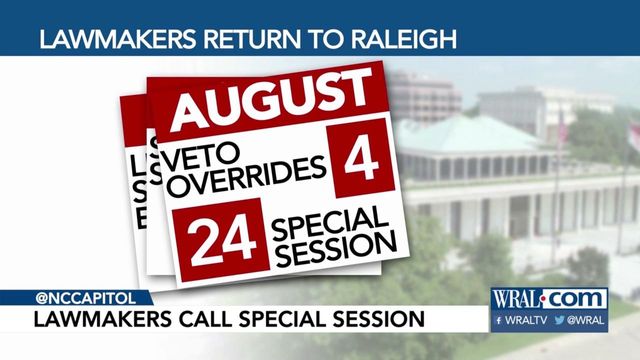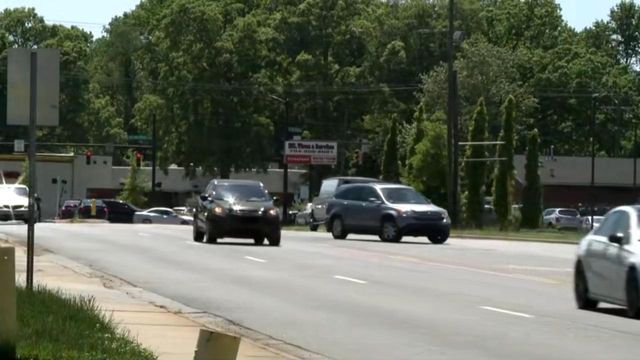Lawmakers call another special session on proposed amendments
The Republican leaders of the General Assembly are calling lawmakers back into session to rewrite descriptions of two proposed constitutional amendments they want on voters' ballots in November.
A three-judge panel said this week that the ballot descriptions, as currently worded, did not give voters a fair and nondiscriminatory explanation of the amendments, as state law requires. They suggested that lawmakers rewrite them, and said the court would not supervise that process, leaving it "in the hands of the General Assembly, subject only to constitutional limitations."
The special session, to be begin Friday at 9 a.m., will be the second that Republican leadership has called to address amendments originally passed during their regular session earlier this year.
House Speaker Tim Moore said in a release Thursday that state lawmakers plan to rewrite the ballot language "because the proposals provide a popular bipartisan balance in our state government that will benefit the people of North Carolina."
Both amendments shift appointment powers from the governor's office to the General Assembly.
"We hope this will end the unnecessary litigation and allow our state to move forward with the democratic process to let the people decide these issues for themselves," Moore said in the statement.
Senate President Pro Tem Phil Berger said in his own statement that he expects the Senate to consider new language Monday. To meet a federal election deadline of Sept. 22 the ballot language must be finalized for printing by Sept. 1, the State Board of Elections and Ethics Enforcement has said.
Berger also said the proposed language will be public for at least three days before the General Assembly holds its final vote and that the actual legislation will be released "as early as practicable."
“I disagree with the court’s decision on the merits," Berger said in his statement. "It’s clear, though, that protracted litigation could delay ballot printing and only further the chance for voter confusion. Given those circumstances, I support a special session to write amendments that comply with the court order as quickly as possible.”
Gov. Roy Cooper was dead set against this new session when asked about it Wednesday.
"For them to come in and do something here at the last minute is so wrong for our state," Cooper said. "We need to get on with these elections ... and wait until next year to discuss those kinds of things."
Legislative leaders blamed Cooper Thursday for pushing this process into the last minute, saying he should not have waited five weeks after the General Assembly passed the original amendments to file his lawsuit. Cooper's suit is one of two targeting these amendments. The other was filed by the state NAACP and Clean Air Carolina, an environmental group.
State Rep. Marcia Morey, D-Durham, said in an email the fault for this latest last-minute session falls at Republican feet.
"In a word I’m furious," she said. "I didn't sign up to be a 911 responder on call at a moment’s notice to put out fires they set."
House Democratic Leader Darren Jackson, D-Wake, said the session is more proof the General Assembly is broken.
"During normal sessions, we failed to do enough to improve health care or our schools," Jackson said. "Instead, voters see time and money wasted on special sessions, power grabs and favors for special interests."
All five living former North Carolina governors have come out against these two amendments and, on Thursday, all six living former chief justices of the state Supreme Court came out against them as well.
Regardless of the outcome on these two amendments, four other constitutional amendments will appear on ballots this November. One would require photo ID to vote, with details on what IDs would be accepted to be written later.
One would cap state income taxes at 7 percent. One would enshrine the right to hunt and fish in the state constitution and one would expand court notice requirements for crime victims.
All six amendments passed during the regular session that ended June 29. Legislators came back into session later to remove power from a state commission, made up of two Democrats and one Republican, that otherwise would have written short captions to describe the amendments on the ballot. Republican leaders said they were worried the commission would write captions meant to sway voters against the amendments.
With that change made, the plan was to simply identify each amendment as "Constitutional Amendment" on the ballot, followed by these descriptions of the two amendments still in question:
"Constitutional amendment to implement a nonpartisan merit-based system that relies on professional qualifications instead of political influence when nominating Justices and judges to be selected to fill vacancies that occur between judicial elections."
"Constitutional amendment to establish a bipartisan Board of Ethics and Elections to administer ethics and election laws, to clarify the appointment authority of the Legislative and the Judicial Branches, and to prohibit legislators from serving on boards and commissions exercising executive or judicial authority."
The three-judge panel rejected both these summaries as misleading.
The first amendment would create a commission to vet judicial candidates, then have the legislature forward two names to the governor, who would have to pick one of those two. Currently the governor can fill judicial vacancies largely as he or she sees fit.
The second would replace the current State Board of Elections and Ethics Enforcement, largely appointed now by the governor, with a board made up of four appointees approved by the legislative majority and four by the legislative minority. This amendment would also cement the legislature's disputed ability to take hundreds of other appointment powers from the governor and make those appointments itself.
These issues have been the subject of a power struggle, and several lawsuits, between the governor and the legislature going back to former Gov. Pat McCrory's administration.












